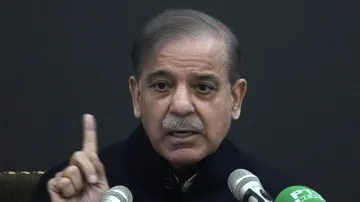Islamabad: Pakistan Prime Minister Shehbaz Sharif will embark on a three-day visit to Saudi Arabia from Saturday (April 6), marking his first foreign trip since forming a coalition government in the cash-strapped country. Shehbaz will meet the Saudi leadership, including Crown Prince Mohammad bin Salman and discuss issues of mutual interest, according to Pakistan's Foreign Office.
Shehbaz, who assumed office as Pakistan's prime minister for a second time last month, will also perform Umrah (in Makkah) and offer prayers at the Masjid Nabwi Al-Sharif (in Medina) during the visit from April 6 to 8 during the last days of Ramadan, according to the Foreign Office. He will be accompanied by the ministers for Foreign Affairs, Defence, Finance, Information and Economic Affairs, as per the statement.
During the visit, PM Shehbaz is expected to meet the Crown Prince and Saudi Arabia Prime Minister Mohammad bin Salman, discuss issues of mutual interest, and exchange views on regional and global developments. They are also set to hold discussions on various projects during the meeting, the Foreign Office said.
Pakistan in need of financial support amid debt crisis
The newly-elected PM would also renew his invitation to his Saudi counterpart to visit Pakistan. Multiple development projects would be finalised, along with bilateral cooperation in several sectors, including agriculture, between the two countries, sources told Geo News. Shehbaz would hold discussions with his elder brother and Pakistan Muslim League-Nawaz (PML-N) supremo Nawaz Sharif before leaving for Saudi Arabia.
Pakistan and Saudi Arabia are longtime allies, with Islamabad often turning to Riyadh for financial help during its balance of payment crises. Since it averted a sovereign debt default last summer by securing a $3-billion IMF bailout, Pakistan has been in dire need of financial support from the multilateral lender and friendly countries.
In addition to financial support, Pakistan has lately been trying to secure Saudi investment in industries ranging from agriculture to mines, minerals and aviation. Pakistan says Saudi Arabia has shown interest in acquiring government stakes in Pakistan's Reko Diq gold and copper mine, which could be a major deal for the $350-billion economy.
PM's steps to address economic crisis
Recently, Shehbaz said that a long-term bailout from the International Monetary Fund (MF) was inevitable for the broken economy, without which Pakistan would not be able to survive. This came a day after the IMF said it had agreed to a provisional or staff-level agreement with Islamabad which, if approved by its board, will disburse the last tranche of $1.1 billion under the $3 billion standby arrangement.
Earlier, the PM abruptly announced banning the use of "red carpets" at government events as part of austerity measures to cut down unnecessary expenditures in the cash-strapped nation. Instead, the red carpets would be used exclusively for diplomatic receptions. The PM expressed annoyance at the use of red carpets for federal ministers and government figures at official events.
By eliminating the use of red carpets, the government aims to save funds and promote a more responsible and prudent approach to public finances. It represents an effort to curb unnecessary expenditures and redirect resources to more critical areas of governance.
Earlier in March, Shehbaz and members of the Cabinet decided to voluntarily forego their salaries and perks as part of the government’s efforts to promote austerity. These measures are considered cosmetic to show that the government was sharing the burden of the people badly hit by grinding inflation. In reality, the president, the prime minister and most of the ministers belong to the privileged, rich class and are not dependent on their salaries.
(with inputs from agencies)
ALSO READ | 'False and malicious propaganda': India rejects allegations of targeted killings in Pakistan
Latest World News
